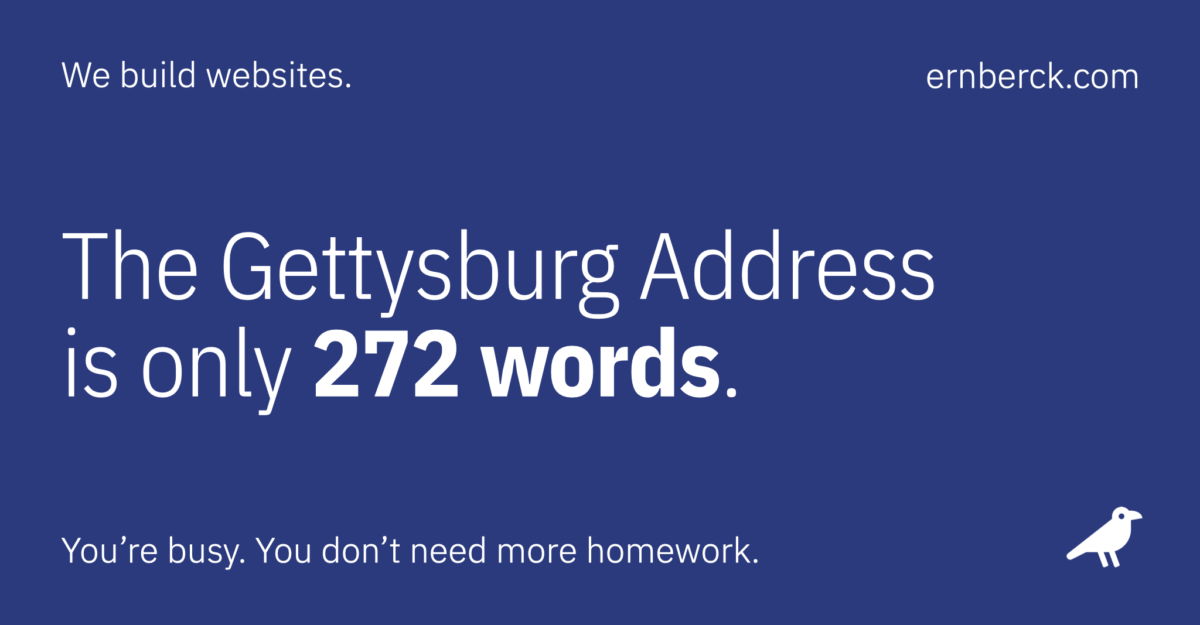Do people really read long-form content? Or, do they just scan, scroll, scan some more, then share — leaving the impression that they actually read something in its entirety.
The best length for a blog post
I read an article the other day that suggested that the best length for a blog post was 1,447 words. No more, no less. The author came to this conclusion by analyzing 11.8 million Google search engine result pages (SERPs).
He went on to say that “this correlation could be due to the fact that longer content generates significantly more social shares,” a strong signal of social proof used by Google to rank web pages.
How long is 1,447 words?
One typewritten, single-spaced, letter size page holds about 500 words. So 1,447 words is roughly three pages of dense text, or about six pages of not-so-dense text. Either way, it’s a lot to tackle on an iPhone SE while driving.
Read or scan?
After consuming this lengthy, well-researched article (written by a highly-regarded SEO professional), I got to wondering. Just about everybody agrees that we live in an age of content shock — bombarded by messages at every glance and click.
We seemingly don’t have the time to read the second sentence of a two-sentence email message, let alone a blog post with 1,447 words. In fact, any website copywriter or marketing expert will tell you that you’ve got to keep it short and simple.
Typical content recommendations:
- Write for a third-grade reading level. No big words.
- Short sentences with as little punctuation as possible.
- Short paragraphs (actually, the trend today is that all sentences are paragraphs).
- Bulleted lists — the more the better.
- Lots of headlines and sub-headlines.
The main point, of course, is that folks no longer “read” content online, they just “scan” it. Presumably their eyes trip over all the lists and headlines but miss all the meaningless words in between.
But wait — if nobody really reads stuff any more, then why are long posts so popular?
Update: October 7, 2024
Google regularly flip-flops on whether or not social shares are a ranking factor. Currently, they claim they’re not. In any case, there are definitely scenarios where social media can help your SEO efforts. While social signals may not be a ranking factor today, social profiles and links can affect your brand’s appearance in search results.
I have a theory
Research can only measure what gets shared, not what gets read. I figure that when people land on a godawful long page, they read a sentence or two, then start scanning, then they get bored, give up, and share the article on social media.
Google confuses “sharing” with “reading” and ranks the shared posts higher. Or, put another way, Google confuses “popularity” with “quality.” Uh-oh.
The social media sharing process probably goes something likes this:
- Yikes, this blog post is long — It must be good.
- Since it’s good, it’s okay to share.
- Besides, if I share a good article, I’ll look smarter.
- I didn’t actually read it, but nobody will ever know. I’m good with that.
For many people, sharing has become a substitute for reading. It’s how they overcome the anxiety and guilt of not completing a task. Plus, they think it’ll make themselves look smarter in the process.
So, should you write short articles or long ones?
I have no idea. Keep in mind that what Google is doing with AI models is effectively extracting the value from user-generated content and turning it into profit, without adequately compensating the creators who made that content valuable in the first place.
No matter the length or type of your content, Google is converting the value that you create, into profit for itself. If that doesn’t seem fair, you’re right — It’s not. You have other alternatives. But that’s a topic for another discussion.
What I do know for sure is that if you spend all your time counting words, you’ll never post anything. If you’re happy writing long stuff, do it. If not, keep it short. But write something, and do it consistently. That’s what counts.
Will this attitude help rocket your posts to the top of Google? Probably not. And I’m not going to analyze 10 million search results to find out. I’m going with my gut.

272 words
Delivered by President Abraham Lincoln in 1863, the Gettysburg Address is regarded as one of the finest speeches ever given. It is a mere 272 words long: 10 sentences, 3 paragraphs, half a page. No video. No animated GIFs. No listicles. No ChatGPT. Of course, Mr. Lincoln wasn’t fretting over shares, social proof, or SERPs — He had other things on his mind.
The Gettysburg Address
Four score and seven years ago our fathers brought forth on this continent, a new nation, conceived in Liberty, and dedicated to the proposition that all men are created equal.
Now we are engaged in a great civil war, testing whether that nation, or any nation so conceived and so dedicated, can long endure. We are met on a great battle-field of that war. We have come to dedicate a portion of that field, as a final resting place for those who here gave their lives that that nation might live. It is altogether fitting and proper that we should do this.
But, in a larger sense, we can not dedicate — we can not consecrate — we can not hallow — this ground. The brave men, living and dead, who struggled here, have consecrated it, far above our poor power to add or detract. The world will little note, nor long remember what we say here, but it can never forget what they did here. It is for us the living, rather, to be dedicated here to the unfinished work which they who fought here have thus far so nobly advanced. It is rather for us to be here dedicated to the great task remaining before us — that from these honored dead we take increased devotion to that cause for which they gave the last full measure of devotion — that we here highly resolve that these dead shall not have died in vain — that this nation, under God, shall have a new birth of freedom — and that government of the people, by the people, for the people, shall not perish from the earth.
Abraham Lincoln
Dedication of the Soldiers’ National Cemetery
Gettysburg, Pennsylvania
November 19, 1863
